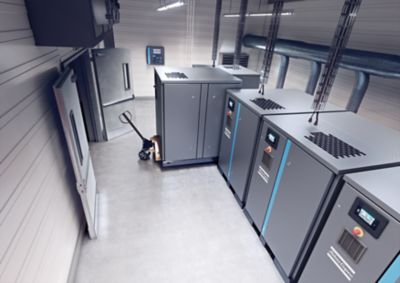October 16, 2020
Improving Beer Brewing Quality with the Right Industrial Compressor & Nitrogen Generator
Estimated reading time: 5 minutes
We rarely think about it, but air and nitrogen interact with the manufacturing process for beer over and over again.
The continuous supply of compressed air and nitrogen is a critical element at every stage of the production process. Industrial Compressors and Nitrogen generators are essential pieces of equipment for purging kegs and tanks, oxygenating beer to promote fermentation, right through to filling, bottling, labelling and packaging the final product.
Industrial compressors
Traditionally, breweries have used oil-lubricated compressors for those processes, but that process can have negative impacts on the beer’s flavour and quality. If air picks up oil particles through the manufacturing process, then the oil can come into contact with the beer being manufactured. This oiled air then attacks the yeast in the beer and results in the flattening of the beer. The frothy head that is such an important part of the beer drinking experience can be gone just like that, for simply using an oil-based compressor.
At the start of each manufacturing instance, industrial compressor solutions pull air into the system, which is then used to increase the pressure to the point where the beer itself can be brewed. From there the liquid-in-production can be pushed through piping, while maintaining exactly the right conditions for beer manufacturing along the way.
Bottling and preventing contamination
The solution to oil-based air compressors
There’s no reason to continue to use an air compressor that uses oil as part of its operation. There are oil-free compressed air systems on the market that can guarantee a far lower risk of contaminants entering the production system. These systems meet the stringent requirements set on beer brewers by the International Organisation for Standardisation - or ISO - which is one of the most important regulatory bodies for anyone involved in food or beverage production to adhere to. What you want is an oil-free compressor that has been ranked as ISO Class 0. This means that a compressor is going to introduce 0 parts per million of oil into the compressed air used through the manufacturing process, when used under normal operating conditions.
Using oil-free air compressors for perfect beer
By choosing the right industrial compressor for your business, whether it be piston, scroll or rotary screw; one that is oil-free and rated as such, you introduce a fifth ingredient into your beer making process, and one that will give you a significant competitive advantage come taste testing time. The four physical ingredients in beer manufacture are grain, hops, yeast and water. But don’t ignore that fifth, intangible ingredient - air. Unless your beer makes use of fresh and uncontaminated air, your beers may not rate as your customer’s favourite. Modern beer manufacturers benefit greatly from the relative ease in production of ISO Class 0 air compressors. The price of these machines is reasonable, and the additional benefits of having oil-free compressors, beyond the reduced risk of contamination, make them the superior economic choice for a brewer of any size. So, whether you’ve got a microbrewery startup, or running a big scale brewery, contact us today to see how we can help keep the quality and standard of your beers at the absolute top of the market.
Nitrogen generators
Over the years nitrogen generators have continued to replace the usage of bottled and liquid N2 in many breweries. You may wonder why. Nitrogen supply can be expensive, and the order refills can be time consuming. However, nitrogen generators are self-sufficient giving you the gas you need at the touch of a button. It also removes safety issues eliminating high pressure bottles or cryogenic tanks and there is no need to store nitrogen cylinders in a space where there is adequate ventilation in case of a leak. To put it simply, it’s also a lot less hassle as you remove the admin and logistics of arranging deliveries and returning the empty cylinders/getting the tank refilled. And most importantly - the usage of nitrogen generators in breweries reduces nitrogen costs to one tenth compared to bottled nitrogen.
What else?
Using air filters to maintain the quality of the beer
Using dryers to prevent moisture in manufacturing process
It’s important that the air in the system is dry and no additional moisture is added in through the manufacturing process. Dryers help to moderate this process and maintain the critical pH levels as the beer is manufactured.
Using water chillers and coolers for time efficiency
Cooler systems are required before the fermentation process, as they allow for the freshly boiled beer to cool quickly and therefore be completed in a more time efficient manner. Because these systems use water from outside, they also feature air from the outside, and while the coolant system doesn’t directly interact with the beer liquid, it does participate in the overall system, and therefore needs to be contaminant-free itself.
Get a health check for your installation Check out our compressed air system health check and energy audit options

